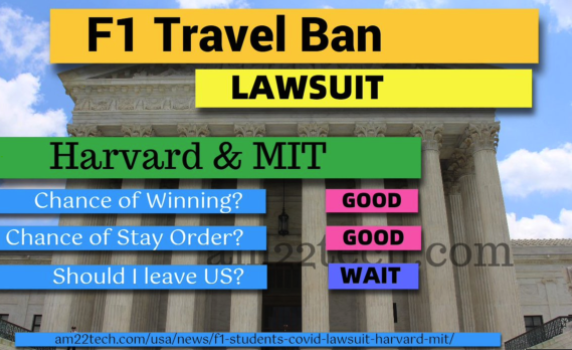Updated July 14, 2020: Trump’s Administration rescinded the ruling. International students have been granted the same provisions they followed last spring. This exemption overrides the pre-existing rule that students in the country on specific student visas (F-1) must attend most of their classes in person.
There was an announcement on July 6, 2020, by the Student and Exchange Visitor Program (SEVP) that caused a massive outcry. In this announcement, international students were told that if their college does not re-open for in-person classes this fall, they are required to transfer to another college that has in-person instructions. Harvard University and Massachusetts Institute of Technology (MIT) have taken action by filing a lawsuit challenging the Department of Homeland Security and ICE. They are also seeking a temporary restraining order and an injunction. This would prevent the government from enforcing the directive because they believe that the administration made the decision purely with the intention to pressure institutions to reopen amid the coronavirus pandemic.
On March 13, 2020, the federal government recognized that COVID-19 preventive measures required the country to put forth protections of public safety and this included the need to allow universities to provide a safe education. International students were given an exemption on that same day which was issued by the United States ICE division of the Department of Homeland Security. This exemption overrode a pre-existing rule that students in the country on specific student visas (F-1) must attend most of their classes in person. “The government made clear that this arrangement was “in effect for the duration of the emergency.” (Harvard and MIT Lawsuit)
This directive prevents international students from studying in the United States on a F-1 or M-1 student visa at the universities that decide not to re-open in person. Throughout the spring and summer semesters, international and foreign exchange students were allowed to take classes online to accommodate the sudden changes caused by COVID-19. There are varying efforts by universities to respond to the directive. The Deaf community has turned to Gallaudet University, Rochester Institute of Technology, and California State University – Northridge to see what their action plan is.
Gallaudet University
Their student body government has put forth a request to the community asking for help supporting international students. The petitions that they asked the community to sign are not limited to supporting students that solely go to Gallaudet University but all international students that go to all schools. The announcement said:
Please support our international students. They can’t return home due to a travel ban, health risk, and countless reasons. We must stop ICE from deporting them.
Gallaudet University put forth a statement sharing their support for International students. “Our international students are a valued member of our University Community,” (Gallaudet University) In the same announcement, there was a note of concern about The U.S. Immigration and Customs Enforcement (ICE) agency’s announcement.
“We oppose the likely consequences of this disturbing development, and we will mobilize our international, legal, and academic teams to ensure that our international students have the opportunities they deserve to continue receiving their education at Gallaudet. We intend to join forces with other universities working to change this new rule.” (Gallaudet University)
CSUN
California State University Northridge (CSUN) President, Dianne F. Harrison, Ph.D. wrote an open letter to her university on July 7, 2020. She too echoes the sentiment the lawsuit had stated that this is a troubling development for their international students. CSUN has been planning for a primarily virtual fall semester. In efforts to protect their students, they are working on identifying solutions that will “mitigate the negative impacts on them.” In the meantime, Harrison stated that the university will continue to keep an eye on further developments and plan accordingly.
Harrison stated that she joins other higher education leaders in calling for these modifications to be rescinded.
NTID/RIT
The Rochester Institute of Technology (RIT) University President, Munson put forth a statement of strong opposition to the directive however has implemented a plan for their university students that are present on a F-1 and M-1 Visa. He began with a statement of the value of their students. RIT has set forth a hybrid plan, “RIT is planning its fall semester on a model that will mix a high percentage of in-person classes with online offerings, which should allow our international students to remain in Rochester and continue their studies.” (Munson)
He also states that if online instruction becomes necessary, these implications could become very serious for the international students that attend RIT and the future of global education. Munson is also working closely with the Congressional delegation to “Elicit support for our international students.” There are also national associations that are asking congress to intervene directly.
Juman Lee from South Korea, an international student at CSUN voiced his concerns about ICE directives and asked the community to sign a petition.
Lee shared a link for the petition from We The People on Whitehouse.gov
Gallaudet University’s student body government pulled these petitions together and asked people to consider signing:
Go to Change.org and sign these petitions:
1) “Allow F-1 and M-1 students to remain in the US with online-only classes“
2) “ICE: Do not deport International Students“
These individuals that face possible deportation if their university does not return to in-person classes are not illegal immigrants. They are here legally on visas that have been pre-approved. They are in a foreign country and very likely terrified of what may happen. If Universities abide by the order, these students will be at a greater risk to be exposed to COVID-19. If you disagree with the directive, be sure to show your support for the international community by signing these petitions and be vocal about your opposition.



